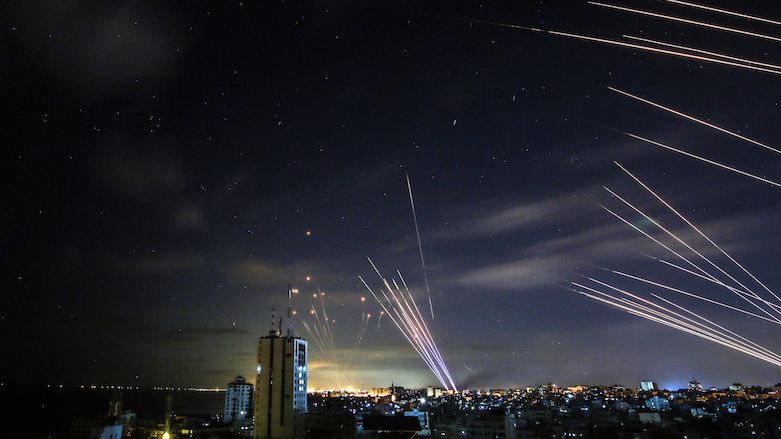As Gaza ceasefire takes effect, US Republicans call for cutting foreign support to Hamas

WASHINGTON, DC (Kurdistan 24) – Some 100 Republican Congressmen, led by Rep. Michael McCaul of Texas, the top Republican on the House Foreign Affairs Committee, sent President Joe Biden a letter on the eve of the ceasefire in Gaza, which took effect early Friday morning local time.
The Congressional letter affirmed, “Israel has an unequivocal right to self-defense,” while calling on Biden “to cut off the support to Hamas that enables it to kill and injure Israeli and Palestinian civilians.”
The Congressmen focused on Iran’s backing of Hamas, noting, “The US government previously estimated that Iran has historically provided up to $100 million annually in combined support to Palestinian terrorist groups, including Hamas, Palestinian Islamic Jihad (PIJ), and the Popular Front for the Liberation of Palestine – General Command (PFLP-GC).”
PIJ and the PFLP-GC, in addition to their relationships with Iran, have close ties to Syria’s Baathist regime, while the Hamas leadership resides in Qatar.
Was Iraqi Militia’s Drone Attack on Erbil a Precedent for Hamas’ Drone Attack on Israel?
Iran has been an essential player in technological advances in the rockets that targeted Israel during the current round of fighting, which began on May 10 and lasted for 11 days.
Over 4,000 rockets were fired at Israel from Gaza, according to the Israel Defense Forces. The tempo of rocket fire was unprecedented, while a city as far away as Jerusalem, nearly 100 kilometers from the Gaza Strip, was targeted for the first time.
As Con Coughlin, Defense Editor for The Daily Telegraph, wrote last Friday, “Iran has played a key role in helping” Hamas to produce “the deadly weapons arsenal that has allowed it to hit targets inside Israel, according to Western intelligence officials.”
Read More: Republicans, Biden administration clash over Iran’s role in Hamas attacks on Israel
“Senior Hamas commanders are believed to have made regular visits to Iran, where they have undergone training in the production and operation of sophisticated weapons systems,” Coughlin continued.
The Palestinians also used a “new explosive drone intended to evade [Israel’s] Iron Dome air defense system, The Wall Street Journal reported on Thursday.
Last month, pro-Iranian militias in Iraq used an explosive drone for the first time. It targeted Erbil International Airport, where troops from the anti-ISIS coalition are based. The drone caused a fire and only limited physical damage ensued.
However, the Commander of CENTCOM, Gen. Frank McKenzie, explained that such small drones – quadcopters – were of significant concern. US air defense systems, like the Patriot (which is stationed in Erbil) can see missiles and bigger drones, McKenzie said, but they cannot see a quadcopter – which could be smaller than a person’s arm – and, therefore, they cannot defend against it.
It seems now that the use of an explosive drone to target coalition forces at Erbil Airport was prelude to Hamas' use of the same weapon, for the same purpose, against Israel. After all, both are backed (and supplied) by Iran.
Like The Daily Telegraph, the Journal explained that since 2014, when Israel and Hamas last fought each other, Iran had developed ways to aid Hamas’ rocket program that circumvented the blockade that Israel and Egypt jointly imposed on the Gaza strip to prevent such assistance from getting through.
“As Israel has become more effective at blocking the smuggling of weapons” to Gaza, “Iran has looked for other ways to help Hamas, supplying designs and know-how the militants can use to make rockets,” the Journal reported. “‘The design is Iranian, but the production is local,’ said Ephraim Sneh, a retired Israeli brigadier general and former deputy defense minister.”
Behnam Ben Taleblu, a Senior Fellow at the Foundation for Defense of Democracies, explained this in much broader terms. Support for proxy forces is a key part of Iran’s expansionist policy in the Middle East.
So Iran “has an evolving proliferation model that stresses domestic production of rockets and other long-range strike capabilities,” Taleblu said. “This model makes it less likely that Iran's material support for terror groups is intercepted or exposed.”
Early on Thursday evening, Biden announced the ceasefire, which took effect on Friday at 2 a.m. local time. Biden affirmed that the “United States fully supports Israel’s right to defend itself against indiscriminate rocket attacks from Hamas and other Gaza-based terrorist groups.”
He thanked Egyptian President Abdel Fattah al-Sisi for the key role that he had played in negotiating the ceasefire.
Biden also said that the US would contribute, along with the United Nations and others, to the reconstruction of Gaza. But US aid, Biden affirmed, “would be channeled through the Palestinian Authority and not through Hamas” and “in a manner that does not permit Hamas to simply restock its military arsenal.”
Subsequently, it was announced that Secretary of State Antony Blinken would travel to the region to “discuss recovery efforts and working together to build better futures for Israelis and Palestinians.”
Editing by Joanne Stocker-Kelly